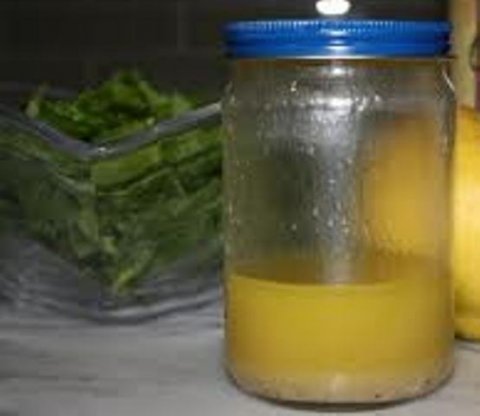You are here
Home ›Dressing for Success

Salad dressings and sauces have a long and colourful history, dating back to ancient times. The Chinese have been using soy sauce for 5,000 years; the Babylonians used oil and vinegar for dressing greens nearly 2,000 years ago; and the ever-popular Worcestershire was derived from a sauce used since the days of Caesar.
Early Romans preferred their grass and herb salads dressed with salt. Egyptians favoured a salad dressed with oil, vinegar and Oriental spices. In the Twentieth Century, North Americans went a step further in salad development…making it a fine art by using BASIC Ingredients (oil, vinegar or lemon juice, and spices).
The dressing is a vitally important element of any salad. It can literally make or break a salad’s success. Unfortunately most commercial salad dressings contain high levels of trans fatty acids, sugar, salt, and preservatives. They also provide no live enzyme value. In 1950 6.3 million gallons were sold. In 1997 this figure rose almost 10 times that amount to 60 million gallons. This demonstrates that more people are eating salads; however, they are not dressed for success!
The classic vinaigrette oil-and-vinegar dressing must be made with the best quality oil and vinegar. The exact proportions depend on the types of oil and vinegar used and personal preference. For most salads nothing can beat the delicious flavour of olive oil. Sesame, walnut and hazel oil all have a pronounced flavour, which is pleasant for a change. Experiment with different vinegars. Red wine vinegar, fruit flavoured cider and raspberry vinegar make an interesting change and so does light-tasting rice vinegar.
Olive Oil
Olive oil is one of the oldest, if not the oldest food oil used by man. Olive oil comes from the fruit of the evergreen olive tree (Olea Europae). Many of the fruit bearing trees are 100-500 years old. It is the major edible vegetable oil in Greece, Italy, Portugal and Spain. Olive oil is a well-known source of monounsaturated fatty acids. It is high in oleic acid (Omega-9) and phytonutrients (plant nutrients). Olive oil contains antioxidants that prevent it from becoming rancid under long-term storage. This means that olive oil is very stable and can be stored for long periods at room temperature.
All virgin olive oils are unrefined. Only high quality, undamaged olives are used to make virgin oils. Leading experts say, virgin olive oils (the only unrefined oils easily available on the mass market) can be recommended for health. “Extra virgin” denotes the first pressing of the oil. Only the highest quality olive oil pressed according to very strict guidelines may be called “extra virgin”.
Lemons
Lemons, scientifically known as Citrus Limon, were originally developed as a cross between the lime and the citron and are thought to have originated in China or India, having been cultivated in these regions for about 2,500 years. Lemons are an excellent source of Vitamin C, one of the most important antioxidants in nature, and contain unique flavanoid compounds that are known to have anti-cancer properties.
Dijon Mustard
Hailing originally from Dijon, France, this pale, greyish-yellow mustard is known for it’s clean, sharp flavour, which can range from mild to hot. Dijon is made from brown or black mustard seeds, white wine, unfermented grape juice (MUST) and various seasonings.
 Mustard is low in calories and cholesterol and also includes minerals such as phosphorus, calcium, magnesium, potassium, selenium and niacin. Mustard is a member of the crucifer family, which includes turnips, radishes, horseradish and watercress all foods known for some degree of heat. Therefore, mustard acts as a thermogenic in the body, meaning it has the potential to help stimulate the metabolism in favour of ‘fat burning.’
Mustard is low in calories and cholesterol and also includes minerals such as phosphorus, calcium, magnesium, potassium, selenium and niacin. Mustard is a member of the crucifer family, which includes turnips, radishes, horseradish and watercress all foods known for some degree of heat. Therefore, mustard acts as a thermogenic in the body, meaning it has the potential to help stimulate the metabolism in favour of ‘fat burning.’
"You don’t have to cook fancy or complicated masterpieces-just good food from fresh ingredients" ~ Julia Child
Everyday Healthy Salad Dressing
Add together in a glass screw top jar.
Makes approximately 1 cup (250 ml) of dressing.
- 1 part (1/2 cup-125 ml) “extra virgin” olive oil
- 1 part (1/2 cup-125 ml) juice from freshly squeezed lemon
- 1 Tablespoon (15 ml) Dijon mustard
- 6 cloves of freshly grated garlic or 1 large clove elephant garlic
Shake vigorously. Taste. If you like it more tart, add more lemon juice, if you like it oiler add more oil. It’s that easy!
Use this Super Savoury dressing to dress salads, marinate meat, fish or chicken, as a side sauce for meats or steamed vegetables, or as a dip for raw vegetables.
Delicate fresh salad greens should be dressed immediately before serving; dressings cause them to wilt. The more robust greens and root vegetables can be dressed ahead. This will allow the vegetables to soften and flavours to blend. Starchy salad ingredients such as potatoes, rice, pasta and beans improve in flavour if dressed while still hot. This allows them to absorb more flavour from the dressing.
Make and store your dressing in a glass screw-top jar. Always remember to shake the jar vigorously to combine the dressing before using. The Everyday Healthy Salad Dressing can be refrigerated up to one week. Take out of the refrigerator before use to liquefy dressing and bring out the flavour.
For a change, I vary the Everyday dressing by using Cory's Sport Oil instead of olive oil, balsamic vinegar or apple cider vinegar instead of lemon juice.
To make Honey Mustard Dressing start with the Everyday dressing and add 1 extra Tablespoon (15 ml) of Dijon and 2 Tablespoons (30 ml) of unpasteurized honey. Very Sophisticated!
Try adding other flavourings such as fresh herbs, ginger root, soy or tamari sauce, or tomato puree. Spice it up with crushed coriander seeds, paprika or curry powder. Add freshly squeezed lime or orange juices, yoghurt, sour cream or various cheeses. It’s always fun to experiment with different combinations.
The Everyday Healthy Salad Dressing is a vital component to good nutrition. It is extremely therapeutic and beneficial for optimum health and performance. The Everyday Healthy Salad Dressing acts as a digestive enzyme in the body, helps to ward off dis-ease in the body, lubricates the joints and definitely satisfies the soul.
"Make food simple and let things taste of what they are." ~ Curnonskey (Maurice Edmond Sailland), French writer (1872-1956)
Most salad dressings are easy to make and if you use the highest quality ingredients you can’t go wrong.
Bon Appetite! TKH

- Log in to post comments